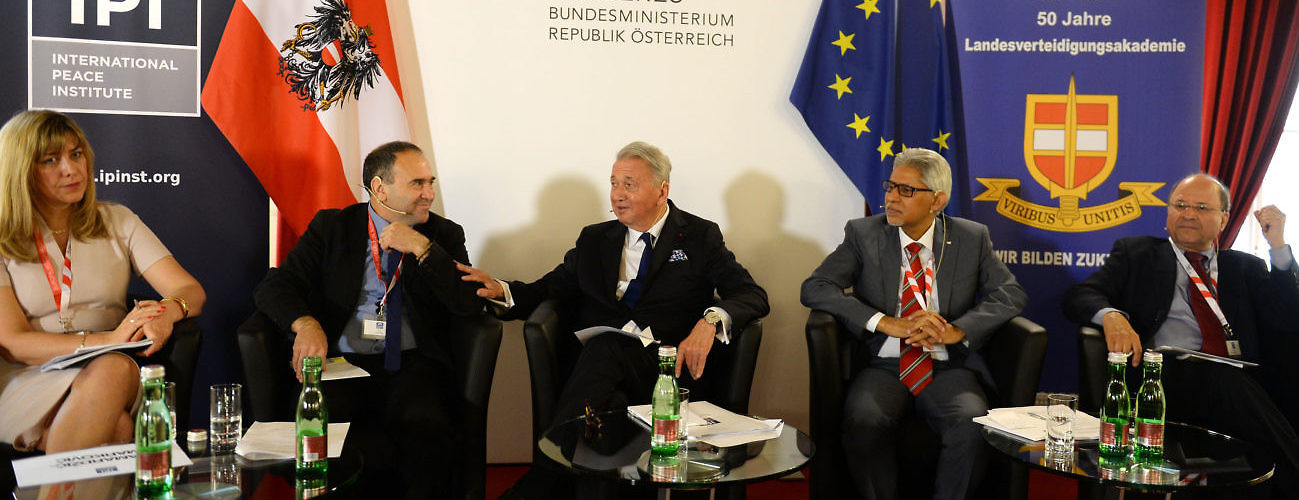Because of war, poverty, and climate change, mass human mobility has become a fundamental feature of our time, and is testing the limits of the multilateral system, presenting extraordinary challenges for countries of origin, transit, and destination. While migration has been a feature of human history since its beginning, and societies around the world have benefited from it for centuries, there are more displaced people today than at any time since World War II. There are many reasons why people choose to move. Yet many people do not so much choose to move, but are rather forcibly displaced by conflicts, disasters, or other perils.
This was the topic of the 47th Annual IPI Vienna Seminar: “Moving Forward Together: Addressing Human Mobility,” held on May 9-10, 2017, in Vienna, Austria, in partnership with Austrian Ministry for Europe, Integration, and Foreign Affairs, and the Austrian Ministry of Defense and Sports.
Multilateral decision making and policy discussions are often removed from the people and places they are concerned with. The 2017 Vienna Seminar endeavored to be different. To effectively deal with the challenges and seize the opportunities that arise out of large movements of people, there is a clear need to involve and empower the people themselves. The seminar aimed to identify effective tools and mechanisms to incorporate refugees, migrants, and internally displaced persons in multilateral policy discussions and operational activities, to ensure that both policies and programs are people-centered, needs-based and inclusive. Each panel session included a representative of refugee, migrant or internally displaced communities.
The seminar began with a dinner on May 9th featuring a keynote address by Ghias Aljundi, a human rights consultant and Syrian refugee. He shared with participants his experience as a volunteer with arriving refugees in Greece. The plenary sessions of the seminar began the following morning in the beautiful Alois Mock Hall of the Federal Ministry for Europe, Integration and Foreign Affairs. Elisabeth Tichy-Fisslberger, Director-General of Legal and Consular Affairs at the ministry provided welcoming remarks, followed by an introduction by IPI President Terje Rød-Larsen. IPI Vice President Adam Lupel served as co-host, introducing each panel throughout the day.
Session one addressed the root causes of displacement and migration in the new multilateral context. Participants discussed what effective strategies can be put in place to address the reasons for the large movement of refugees, migrants and internally displaced people; and they discussed how multilateral commitments such as the 2030 Agenda for Sustainable Development can help to prevent future crises.
The panel began with an introductory presentation by Snežana Samardžić-Marković, Director-General of Democracy, Council of Europe, followed by remarks from Ghias Aljundi, Jagan Chapagain, Chief of Staff and Director, Office of the Secretary-General International Federation of Red Cross and Red Crescent Societies, and Youssef Mahmoud, Senior Adviser, International Peace Institute. The session was chaired by Mr. Rød-Larsen.
Session two examined the challenges of coordination at the domestic and multilateral level. It focused on the need to institute measures to prevent the exploitation of vulnerable people from smuggling and human trafficking. Participants discussed how states can better work together to coordinate their actions while taking into account the needs of migrants and refugees. The session began with remarks by Syrian refugee Ammar Zammar, former Sales Manager, Sama Invest Group, who told his story of how he fled his home country and the perils he faced along the way.
Melissa Fleming, Chief Spokesperson, United Nations High Commissioner for Refugees, followed with a visual presentation documenting the extreme vulnerability of refugees traveling by boat to Europe through the incredible story of one family’s tragic journey. Madina Jarbussynova, Special Representative and Coordinator for Combating Trafficking in Human Beings, OSCE, and Richard Baumgartner, EU Affairs Advisor, Frontex, provided a discussion of the policy responses to these challenges in Europe. Brigadier-General Reinhard Trischak, Austrian Federal Ministry of Defence and Sports provided opening remarks and chaired the session.
Session three addressed the particular challenges of internal displacement, an all too often neglected aspect of human mobility. While the recent high level discussions on refugees and migrants did not address internally displaced peoples (IDPs), states did note the need for reflection on effective strategies to ensure adequate protection and assistance for them. The panel featured remarks by Alexandra Bilak, Director, Internal Displacement Monitoring Centre; Pierre Gentile, Head of Protection Division, International Committee of the Red Cross; Cecilia Jimenez-Damary, UN Special Rapporteur on the Human Rights of Internally Displaced Persons; and Asha Abdi Osman, a former IDP from Somalia. The session was chaired by Els Debuf, Head of Humanitarian Affairs, International Peace Institute.
One common theme throughout the day was the importance of integration. The successful integration of refugee, migrant, and internally displaced populations in host communities is crucial to address the challenges and to best take advantage of the opportunities that arise when people are on the move. What are the key components of successful integration strategies? What works? This was the topic of session four. The session began with a dynamic presentation by Fatuma Musa Afrah, a migrant and social worker from Kenya living in Germany.
Further remarks were given by Dominik Beron, CEO of Refugeeswork.at; Martin Hoffmann, Senior Policy Advisor, International Centre for Migration Policy Development; and Ignasi Calbó Troyano, Coordinator, Barcelona Refuge City Program.
Discussion throughout the day balanced between personal experience and practical policy responses, building on the principles and commitments that came out of the World Humanitarian Summit and the Refugee and Migrations Summits of 2016. Through an outcome meeting note and the participation of practitioners, inputs from the Seminar will feed into the international community’s work in 2017-2018, in particular through the negotiation of the global compacts on refugees and migration and a planned high-level event on IDP’s.








